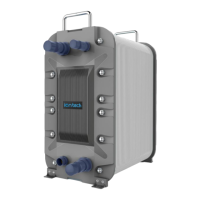IONTECH
®
IT-DS EDI Modules
NOTE: The above calculations assume 20% current efficiency, which is suitable for
many applications. However, certain applications, such as those requiring high silica
removals, may require operating at 10% current efficiency, or two times the amperage
calculated above. The modules should be set to operate with a constant
current allowing the voltage to fluctuate with changes in temperature, flow, etc.
Test IT-DS module feed water to ensure that feed water parameters are within the required ranges.
The most common tests are listed in Table 3-2.
Test flow switches and other interlocks, including the RO interlock if applicable
Test pressure relief if applicable
3.5.1 Start-up IT-DS module
Make sure that modules are correctly connected to the DC power source.
Make sure that the IT-DS product piping line is directed to drain.
Turn on the feedwater. Adjust valves to obtain the desired flows and pressures in the
product and reject streams. Standard IT-DS reject flow is typically set at about 11% of the
product flow (this gives a water recovery of 90%). See Section 3.6 on recovery, hardness
and silica for additional information regarding recovery. Valves are adjusted so the
product outlet pressure is about 2 to 5 psig higher than the reject(concentrate)
outlet pressure at the desired flow rates. This pressure balance is critical to
ensure optimal EDI performance.
Adjust the DC power supply to the current setting calculated in Section 3.4.3. Or use the
DC Startup Current Calculator available on Iontechbj.com.
Test all flow switches and interlocks to ensure IT-DS DC power is shut off when flow is
Continue to direct the product water to drain until it reaches the desired quality.
Once product reaches the desired quality, connect to process. Readjust pressures as
required to maintain product(dilute) outlet pressure 2-5 psi above the reject(concentrate)
When the system is at steady state (quality in specification and stable operation), record
operating data on the data sheet provided in Section 4.1.1.
3.6 Recovery, Silica and Hardness
IT-DS recovery of 95% is limited to systems with feed water total hardness of less than or equal to
0.2 ppm as CaCO
3
. Reduction of hardness is normally accomplished with ion-exchange
softening or with two-pass RO. In addition there are minimum reject(concentrate) flow with
requirements listed below in Table 3-3. Therefore, 95% recovery is not always attainable for less
than nominal product flow rates.

